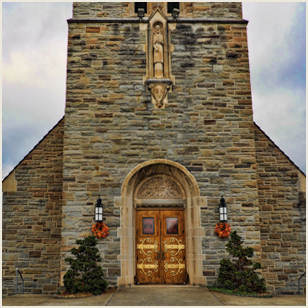Adversity, Cross (your), Discipleship, Page: Quotes, Quote Author, Quote Topic, Therese of Lisieux (1873-1897)
Our Lord never asks sacrifices from us beyond our strength. At times, it is true this Divine Savior makes us feel all the bitterness of the chalice that He is offering our soul. When He asks the sacrifice of all that is precious in this world, it is impossible, without a very special grace, not to cry out like Him in the garden of agony… It is very consoling to think that Jesus, the Strong God, knew our weaknesses.
–Saint Therese of Lisieux (1873-1897)
Abandonment (of self), Acceptance, Grace, Page: Quotes, Quote Author, Quote Topic, Therese of Lisieux (1873-1897)
No doubt, it is a grace to receive the sacraments. When God does not permit it, it is good too! Everything is grace! When I shall have arrived at port, I will teach you how to travel…on the stormy sea of the world: with surrender and the love of a child who knows his Father loves him and cannot leave him alone in the hour of danger…The way of simple love and confidence is really made for you.
–Saint Therese of Lisieux (1873-1897)
Fulton Sheen (1895-1979), Humility, Page: Quotes, Quote Author, Quote Topic
Humility is dependence on God as pride is independence of Him. The humble soul is always the thankful soul.
–Blessed Fulton Sheen (1895-1979)
Abandonment (of self), Fulton Sheen (1895-1979), Page: Quotes, Quote Author, Quote Topic, Spiritual (life)
When we die to something, something comes alive within us. If we die to self, charity comes alive; if we die to pride, service comes alive; if we die to lust, reverence for personality comes alive; if we die to anger, love comes alive.
–Blessed Fulton Sheen (1895-1979)
Eucharist, Fulton Sheen (1895-1979), Page: Quotes, Quote Author, Quote Topic
Why did Our Blessed Lord use bread and wine as the elements of this Memorial? First of all, because no two substances in nature better symbolize unity than bread and wine. As bread is made from a multiplicity of grains of wheat, and wine is made from a multiplicity of grapes, so the many who believe are one in Christ. Second, no two substances in nature have to suffer more to become what they are than bread and wine. Wheat has to pass through the rigors of winter, be ground beneath the Calvary of a mill, and then subjected to purging fire before it can become bread. Grapes in their turn must be subjected to the Gethsemane of a wine press and have their life crushed from them to become wine. Thus, do they symbolize the Passion and Sufferings of Christ, and the condition of Salvation, for Our Lord said unless we die to ourselves we cannot live in Him. A third reason is that there are no two substances in nature which have more traditionally nourished man [and woman] than bread and wine. In bringing these elements to the altar, men [and women] are equivalently bringing themselves. When bread and wine are taken or consumed, they are changed into [one’]s body and blood. But when [Jesus] took bread and wine, He changed them into Himself.”
― Fulton J. Sheen, Life of Christ
Ignatius of Loyola (1491-1556), Page: Quotes, Quote Author, Quote Topic, Spiritual (life)
Since the object of our love is infinite, we can always love more and more perfectly.
–Saint Ignatius of Loyola (1491-1556)

